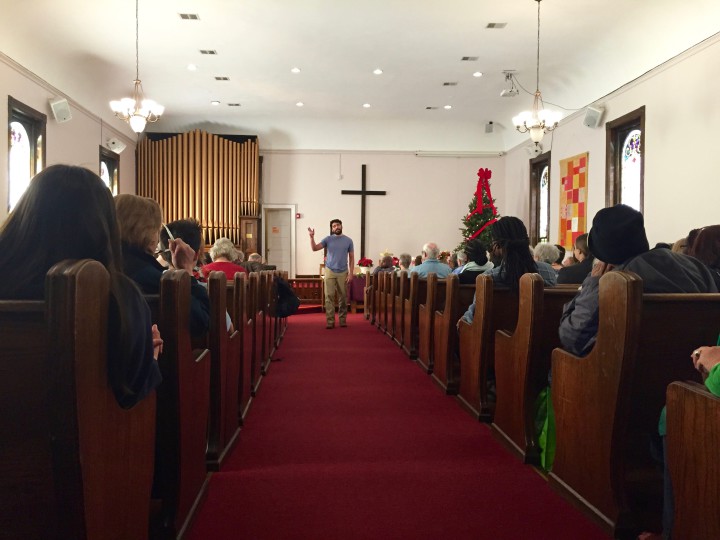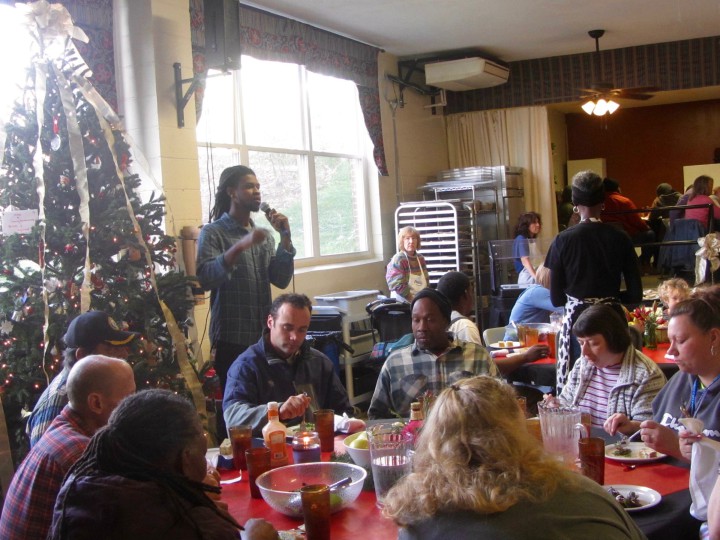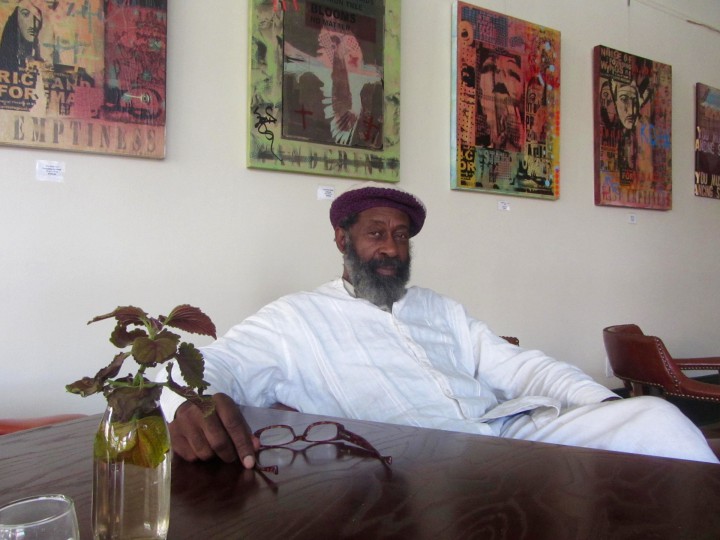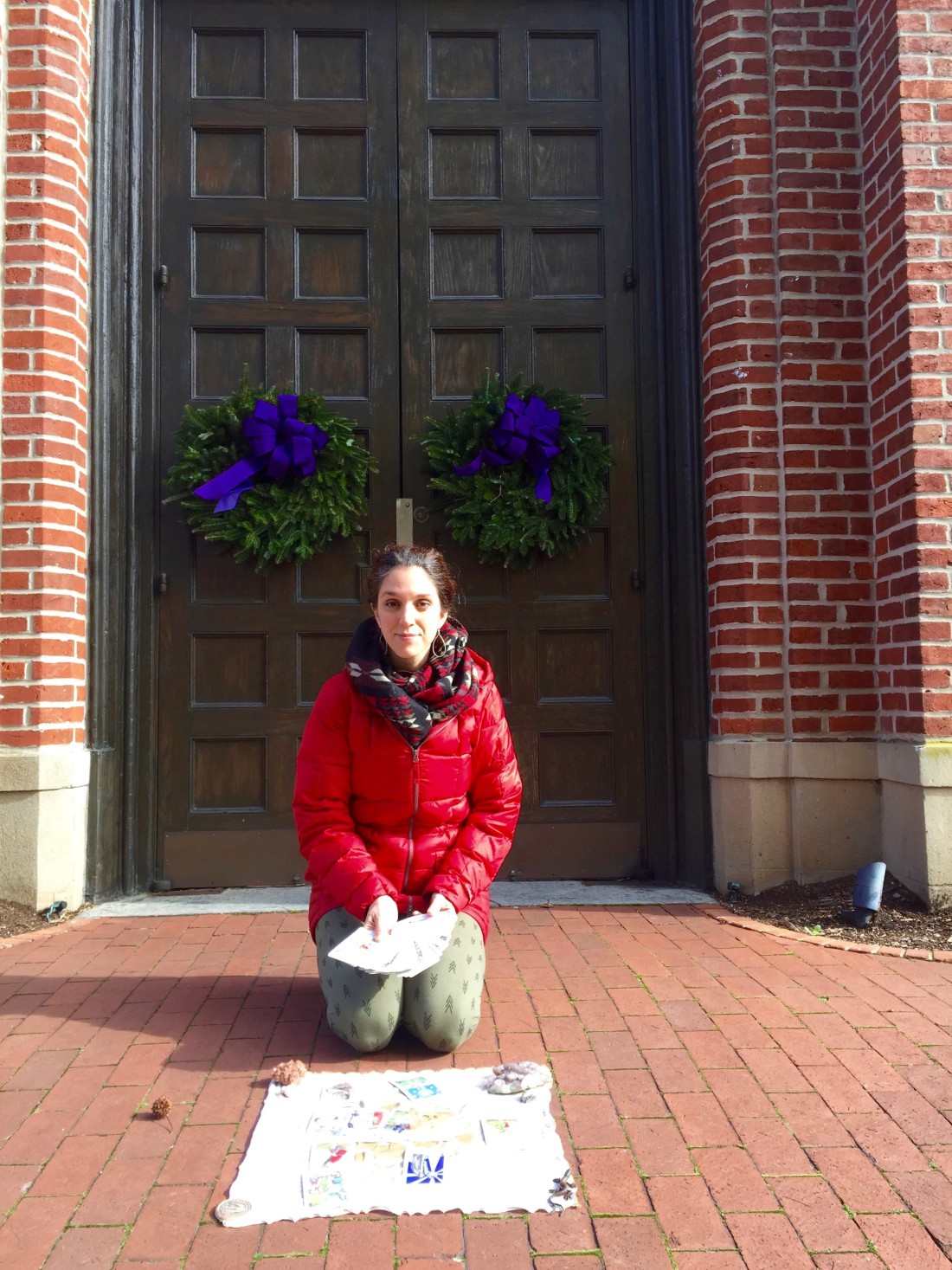“Just for the record, I’m spiritual, not religious.” If you live in Asheville, this probably sounds familiar.
In our postmodern age, many have abandoned whatever religion their ancestors followed, preferring to cut and paste from any and all traditions. Sometimes, however, this can mean taking what feels good and leaving the rest. And with information about almost everything now available on demand, it becomes ever more tempting to sample it all, if only to ensure that we’re not missing anything.
But at what point does spiritual exploration morph into consumerism? Do we risk merely succumbing to a drive to gratify our own appetites — and move on to something new whenever the path gets steep?
Some maintain that seeking out only the spiritual highs can eventually devolve into a never-ending string of “honeymoon” experiences that take you only so far. In order to be truly transformed, the argument goes, people need to get some skin in the game, stepping out of their comfort zone and shifting the focus to serving others.
“With social media, there’s just a tremendous amount of distraction in the world,” says Dorothy Riddle, chair of the School for Esoteric Studies in Asheville. “Spiritual development requires discipline and commitment.”
Off to distant lands
After an adolescence marked by declining faith and church participation, Monica Bethelwood made a decisive break with Christianity, her childhood religion. Then in her late teens, Bethelwood was living in New York City when she discovered East West Books, a small metaphysical bookstore in Greenwich Village whose abundantly stocked shelves promised infinite windows into the secrets of distant lands, catalyzing her nascent foray into spirituality.
“There were a few books there that just pulled me in and helped me start understanding God in a way that I hadn’t before: outside of a religious sense, and more in the sense of how you feel, the energy and the connections between myself and everything around me,” she explains.
The artist and musician spent three years hitchhiking around the country offering tarot divinations while dabbling in the assorted spiritual traditions embraced by the people she met: peyote ceremonies, yoga, various New Age philosophies and mysticisms.
When she landed in Asheville in 2012, Bethelwood “became connected to this community where there were fire circles, breath workshops, goddess workshops, ecstatic dance.” The first year, she immersed herself in a multifaceted spiritual repertoire involving custom combinations of traditional rituals.
But after a while, says Bethelwood, she realized that none of the things that had inspired her to embark on this spiritual path — the healing, the peace, the understanding and clarity she sought — seemed to be forthcoming.
“There was a part that was very glamorous,” Bethelwood says now. “There’s a look to it; there’s a brand that says, ‘I am peaceful, I am going with the flow.’ ” And it wasn’t just the physicality and peaceful persona that were so seductive, she recalls, but the “exotification” of the traditions and rituals explored.
After years trying to grow into that spiritual identity, however, she began to feel that, for her at least, the whole thing was forced.
One evening, she took part in a Peruvian ceremony held at a neighbor’s house. “We were standing and holding our hands around this blender filled with cacao, chanting ‘om,’” she recalls. “Afterward, we ended up sitting in a circle on the floor, going on this ‘energetic meditation journey’ in our ‘imagined spacesuits.’” And she found herself wondering, “Why are we doing this? How much understanding of cacao and toning do we really have? Or is this guy just collecting money at the door?”
The experiences, says Bethelwood, were elevating, but they seemed more about personal recreation than about serving others. Enveloped in imagined spacesuits, she felt, she and her friends were aiming straight for the outer galaxy so they could surf the stars without ever having to step out of that bubble into the motley crowd of earthlings. And in the process, she came to believe, they were omitting a vital step on the spiritual path.
Taking responsibility
Upon entering Crystal Visions, the visitor encounters fliers advertising energy healing, soul retrieval sessions and a wide array of spiritual events and classes. The shelves are filled with crystals of every sort, incense, meditation CDs and other ritual objects drawn from a smorgasbord of spiritual traditions. But above all, there are books: walls of unconventional, esoteric publications concerning everything from shamanism to astrology, numerology to Celtic studies, mediumship to the Abrahamic traditions.
The store opened in 1989, a joint venture of Blair Justice and her partner, Joan Colburn. For 26 years, their mission has been serving spiritually oriented people who are seeking paths other than conventional religion, Justice explains.
“To me, spirituality is one’s personal relationship with themselves and with the ‘all that is,’ however people define that,” she says. Religion “is a way of being spiritual that has rules and guidelines, doxologies and expectations.”
Justice was raised in the Fletcher United Methodist Church, and though she never had a falling-out with her childhood religion, she does recall embarking on her spiritual path in the ’60s after discovering “science of mind” and “new thought” literature. Over the years she’s incorporated a panoply of esoteric teachings into her spirituality. “It’s a very eclectic relationship that I have” with the divine, she reveals.
!["Certainly walking your talk is important," says Blair Justice (pictured), "and many hermits [and] monks may live in solitude or quietude but still serve the Oneness by sending out beneficial thoughts."](http://mountainx.com/wp-content/uploads/2015/12/IMG_3027-copy-720x540.jpg)
“The New Age movement, if you want to call it that, is about personal responsibility,” she says. “It’s about believing that you can create a reality that’s a great one. It’s about taking responsibility for who you are, how you live in the world and how you treat other people.”
Indeed, for many seekers today, that’s the crux of spirituality: letting go of the faith in an omnipotent, divine arbiter and investing oneself in a metaphysical web stemming from one’s own thoughts and actions.
And for those who aren’t comfortable with organized religion’s sometime tendency toward social conformity, this alternative brand of spirituality offers the added benefit of keeping one’s practices personalized — and private.
Give and take
The problem with going it alone, though, says Riddle, is that “you don’t know what you don’t know.”
The School for Esoteric Studies teaches what it calls the “ageless wisdom” — the common thread of spiritual truths distilled from a number of religious traditions in the theosophical writings of Alice Bailey and further developed by the school since its founding in 1956 in New York City. At its current location on South French Broad Avenue, the school has an international membership of about 500, with some 20 active students at any given time in its distance learning curriculum.
For Riddle, shedding belief in a divine arbiter — or, for that matter, the realization that we are connected, energetic beings — doesn’t automatically lead to “discipleship” or even to taking responsibility for others and the world we live in.
“A lot of New Age activity can be very self-absorbed, feeling-good type activities that don’t necessarily contribute to the world as a whole,” she asserts, adding that her school attracts many spiritual adventurers, who often don’t last very long in the work.
One of humanity’s core problems, says Riddle, is “a tendency to take and not give,” which interrupts the circular flow that maintains universal balance. At her school, she explains, service to others — and sticking with it even when it becomes arduous — is an integral part of students’ practice. “We don’t ask students how they enact it — that raises the potential for glamour or bragging about what they’re doing.” But the school does encourage students to participate in the World Goodwill initiatives of the Lucis Trust (a nonprofit established by Alice Bailey), which address areas like conflict resolution and earth stewardship.
And while the Internet has made all sorts of spiritual material more accessible, there’s a downside, says Riddle.
“When students drop out, they typically do so at the beginning — and the most common reason is that it requires too much effort.”
Contract vs. covenant
“There’s something so alluring about whatever is novel,” notes the Rev. Brian Combs, founder of The Haywood Street Congregation in downtown Asheville. “And the seduction, for me, is to walk into the spiritual bookstore and say, ‘This title is going to have the answer.’”
Today, he continues, most of the world — or at least most Americans — are “obsessed with ‘contract.’ I’m willing to make a commitment to you as long as it’s good for me — but that contract better have some legalese in there about an exit clause and annulments that get me out of this when it gets hard.”
Being firmly committed to a particular path, however, doesn’t have to mean it’s the only way, or that other paths are wrong.

In contrast to contract, he explains, “‘Covenant’ is the language of religion. Our response to a covenant is to say, ‘We’re probably going to screw this up,’ but over and over again we’re going to say ‘yes’ to this relationship.”
Many spiritual seekers, says Combs, sign on until the initial euphoria wears off and it’s time to come down from the mountaintop. Those heights are exhilarating, he concedes, but the true depth of a spiritual path is the time spent down in the valley.
Founded in 2009, The Haywood Street Congregation now features a permaculture garden and an ever-growing array of services: the Downtown Welcome Table, a clothing exchange, a story circle, haircuts and acupuncture, as well as a Wednesday Worship whose audience includes young and old, penniless and professional, LGBT and straight, black and white.
In Christianity, notes Combs, the period between Advent and Easter is full of ritual, ceremony, euphoria and promises of transformation. But in the vast expanse that falls between Easter and Advent — known as Ordinary Time in the liturgical calendar — holy days and ceremony are much less in evidence.
Ordinary time is the time in the valley: the long slog through the desert, and the sometimes difficult day-to-day dealings with one’s fellow humans. It’s where the numinous feels most remote, yet for Combs, it’s the part that he’s increasingly learned to trust in pursuing his own spiritual transformation.
Skin in the game
On a sunny Wednesday in mid-December, a crowd of folks from every walk of life hovers in clusters on the sidewalk between a chain-link fence and the basement of the Haywood Street United Methodist Church, where Combs’ congregation is housed. It’s 11:30 a.m., and they’re awaiting the Downtown Welcome Table’s next seating. Today’s event is being catered by the Corner Kitchen and Chestnut, two of the 32 local restaurants that take turns providing food for the full-service weekly offering.
Some of those gathered clutch trash bags containing a sleeping bag and other necessities for cold nights; others sport well-ironed cardigans and blouses. The Welcome Table is open to all: Everyone’s invited to come together, sit and eat; to serve and be served.

Combs, however, draws a sharp line between charity and service. “Charity, as well-meaning as it is, always comes with a number of assumptions,” he says. “One is paternalism: If you’re in poverty, I look down on you, and one of the ways is to say, ‘You’ve got a brokenness that I can fix.’”
It’s not that one shouldn’t offer to help, he explains, and charity may be a good first step. But “The second move is to say that, as a person of privilege, let’s pay attention to my spiritual poverty. And you only get in touch with that if you’re with folks who’ve been marginalized.”
To underscore the difference, Haywood Street enlists “companions” rather than “volunteers” — and their role is not only to give of their time by busing tables or dispensing food but to receive the spiritual fulfillment and transformation that come with serving others.
When he’s not at the church, Combs can often be found at the AHOPE Day Center or a local hospital — not preaching salvation but seeking it, living out his own covenant with the divine by saying “yes” to his fellow humans in ordinary time.
“In my opinion, AHOPE, the psych ward, the prison — those are the gates to heaven in this town, so I show up there,” he says. “I don’t have a conversion agenda: I’m not there to save anybody but, rather, to be saved. I’m not there to be Jesus but to meet him.”
Rich or poor, black or white, educated or uneducated, immaculate or marred, stresses Combs, our spiritual liberation is bound up with those who aren’t like us. Maintaining a spiritual practice that avoids the “other,” he believes, is a rut that both conventionally religious and alternatively spiritual people often find themselves falling into.
Local interfaith chaplain Robert Zachary agrees. Most religious and spiritual communities today have shut their doors and become insular, he believes. And instead of getting caught up in talking about who our guru is, where we did our vipassana retreat, who our pastor is or what school we went to, Zachary maintains, “It’s about how effective can we become with each other, and what are we going to do now, in this moment?”
Returning to covenant
In the fall of 2013, after about a year and a half spent surfing countless metaphysical traditions, Bethelwood and her future husband returned to the church.
“In all the New Age culture,” she felt, “there wasn’t that drive to ask, ‘Hey! What are we going to do today to serve the community?’ I didn’t see a lot of true service: It seemed to all come with a price, and it was selfish in a lot of ways. All of this searching and inward journeying is great, but it’s only so we can get to the next step.”
In the Christian church, on the other hand, “There wasn’t this focus on the individual, personal struggle. It was more about the struggles of others and how we can help them,” says Bethelwood, and through that, she began to find peace and nourishment for her own spirit.
But many in her spiritual-not-religious network didn’t know what to make of her newfound path.
“If I had said I was exploring Voodoo or Kabbalah — or, really, whatever else — people would have been like, ‘Ooh, could I join you sometime?’ But when we told people we were going back to church, it was really jarring for them, and they responded very distrustfully. It felt taboo.”

Stemming from the Latin “religio,” the concept of religion as a distinct entity that’s separate from the rest of life is something the Romans cooked up to refer to colonized cultures’ ritual systems. Within those cultures, though, there was no such concept, since the ritual and ceremony were inextricable from every other aspect of who these people were and what helped them keep life balanced in the ordinary time.
Today, Bethelwood chuckles about the intolerance for Christianity she says she found in a group that otherwise prided itself on inclusivity. Still, she couldn’t help wondering: Did their disdain reflect the fact that so many of these folks had originally fled from their parents’ church? Did inclusivity apply only to those traditions whose ceremonial aspects, having been removed from their context in ordinary time, were now “safe” to contract with?
Coming home
Some scholars trace the word “religio” back to “ligare,” which means “to bind” — in which case “religio” means “to rebind,” to reconnect things that have been separated. But what things? The human and the divine? Humans and other humans? Present-day humans and our ancestors? Or personal ambitions and divine law?
“When I returned to Christianity,” says Bethelwood, “it felt as though I was returning to a parent that I’d run from.”
At First Presbyterian Church, the congregation was “pumped to have us,” she explains, offering a warm welcome and displaying a genuine interest in learning about her prior spiritual explorations, rather than intolerance or suspicion.
Something had changed during Bethelwood’s exodus: Now, she realized, what had seemed like arbitrary commandments and cryptic rules to her child self were actually metaphors and parables full of wisdom. But she’d needed time away, and the freedom to choose for herself, to achieve that understanding.
“Buddhism and Hinduism and the tarot were like the cool aunts and uncles that were informing me during that exploration,” she says now.
When the pastor says, “the devil,” she no longer pictures an external entity but “the ego,” as explained through the tarot. And “sin” is no longer an indictment: It simply means actions that would corrupt her dharma.
Perhaps the difference between organized religion and a more freewheeling spirituality boils down to different visions of liberation. One person seeks it on a path that leads away from binding covenant, and another on a path that leads toward it.
In the biblical parable, a father throws a huge banquet to celebrate the return of the prodigal son who’d abandoned him to gallivant in distant lands. Meanwhile, his other son — who’d been loyal and stayed home — looks on angrily, wondering why he was never feted that way.
But the prodigal returns having learned something valuable: He urges his father to treat him like one of the servants. And perhaps the loyal son never questioned his inherited path enough to be able to freely choose it himself.
For some folks today, it seems, rebinding oneself through covenant — whether it’s with humans, ancestors or divine law — can acquire a deeper meaning when it’s set in the context of infinite choice, pluralism and individual pursuit.
For Combs, though, the specific path may ultimately be less important than the practical results. He cites a Buddhist parable in which a young monk approaches the Buddha and eagerly expresses his desire to reach enlightenment.
“The Buddha’s reply? ‘Just carry water.’”




Before you comment
The comments section is here to provide a platform for civil dialogue on the issues we face together as a local community. Xpress is committed to offering this platform for all voices, but when the tone of the discussion gets nasty or strays off topic, we believe many people choose not to participate. Xpress editors are determined to moderate comments to ensure a constructive interchange is maintained. All comments judged not to be in keeping with the spirit of civil discourse will be removed and repeat violators will be banned. See here for our terms of service. Thank you for being part of this effort to promote respectful discussion.